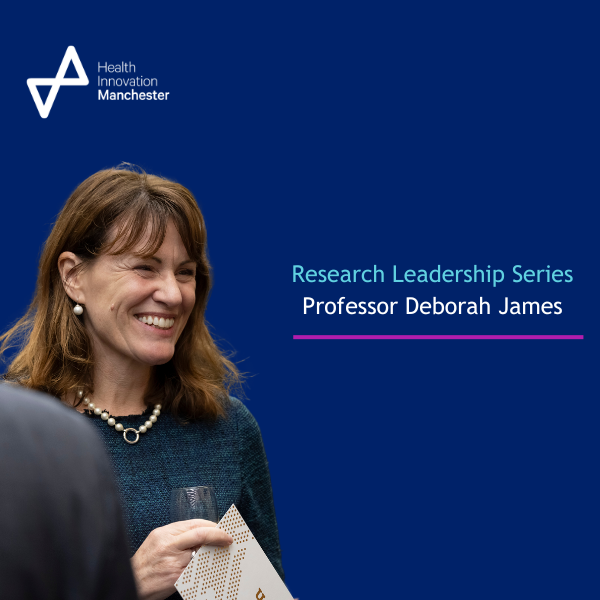Leadership In Research Series: An Interview with Professor Deborah James

For the second instalment in our ongoing series with health academic leaders across Greater Manchester, Ben Diette (Academic Partnerships Manager) had the pleasure of interviewing Prof. Deborah James Deputy Pro Vice Chancellor Health and Social Care and Professor of Educational Psychology at Manchester Metropolitan University.
This series aims to highlight the importance of academic leadership in research and innovation, while gaining insights into their areas of focus, collaboration efforts, and the impact of their work.
Could you tell us about your career journey, including your current role at Manchester Metropolitan University?
My career began in speech and language therapy after I graduated from University College London (UCL) with a degree in Speech Sciences. My path to university was unconventional, as I was a mature student and didn’t meet the traditional entry requirements. I’d had my first child at 19. I was a single mum. So, getting admitted to UCL to do a degree there in speech therapy and speech science was incredible and I graduated with first-class honours. Starting in the NHS, I worked with children facing complex developmental issues in a multidisciplinary clinic, where I began questioning the existing model of care, finding it lacking in its ability to create sustained and meaningful change for families and children with complex developmental circumstances.
My drive to improve these models led me back to UCL’s Institute of Child Health, where I pursued a PhD focusing on the effects of cochlear implants on Deaf children’s language and literacy. This experience deepened my interest in the intersection of psychological development and language acquisition, sparking a continued focus on relational methods. This approach has since shaped my work as I now lead initiatives at Manchester Met focused on child health and relational development in therapeutic and community contexts.
How did your initial experiences shape your current vision and leadership approach in research?
My early clinical experience reinforced the importance of strength-based approaches, a focus I’ve carried forward into my research leadership at Manchester Met. By building on existing strengths — whether in individuals or systems — we aim to make changes that are meaningful and sustainable. This philosophy aligns with Manchester Met’s broader research strategy, where we build our research on existing strengths and deepen the relevance of our research through co-creation and community involvement creating relevant applied research to enhance population health and wellbeing. In practice, this means embracing methodologies like co-production and designing research with ongoing participation with the people it seeks to impact.
What are some of the research strengths and collaboration opportunities at Manchester Met in the coming years?
Manchester Met has a unique expertise in working with children and young people, especially in research that emphasises ethical engagement and respect for lived experiences. We’re especially focused on enabling voices and creating safe spaces for young people to share their experiences positively, avoiding the stigma that can sometimes be a barrier to positive inclusion with health and social care services. For collaboration, there’s immense potential in areas like children’s health and social care, working alongside NHS and community partners. A recent example is our joint project with the GM Creative Health and the other GM universities, exploring creative approaches to healthcare.
How has collaboration with external partners, like clinicians and community organisations, benefited Manchester Met’s research?
Collaboration has been a cornerstone of impactful research at Manchester Met. For instance, Dr Keith Winwood has a leading role in a large UKRI funded project on facial reconstructive science, conducted in partnership with other universities, clinicians, and the NHS. His work, focused on personalised reconstruction for individuals with congenital facial differences, showcases how collaborative research can advance both educational and practical outcomes. Partnerships like these enable us to create and refine solutions that flow from advancements in science – the innovation directly benefit patients and enriches our educational programs.
Why is research impact important, and what are your tips for fostering meaningful impact?
Research impact is crucial because it allows us to translate academic discoveries into tangible benefits for society, particularly in health and social care. At Manchester Met, we recognise that citizens prioritise and value the contributions that universities make to economic growth, health, and social welfare. This insight drives us to produce research that not only advances knowledge but also addresses local needs and challenges.
To foster impact, I encourage a shift from linear, cause-and-effect thinking toward a more integrated, human-centred model. Impact isn’t always a direct result of specific actions; it often emerges from a network of interactions, collaborations, and unexpected outcomes. Viewing impact as part of a learning ecosystem rather than a step-by-step sequence enables us to embrace the dynamic non-linear connections. This approach helps us stay attuned and responsive to the real-world challenges that create vast disparities in population health.


